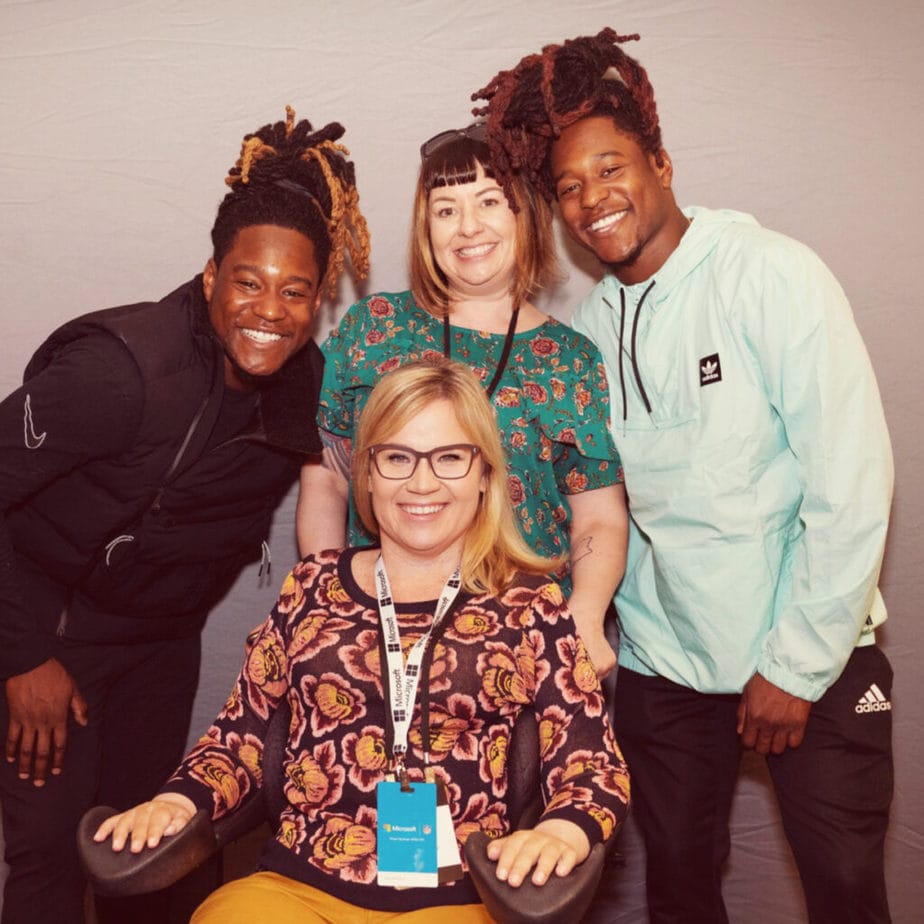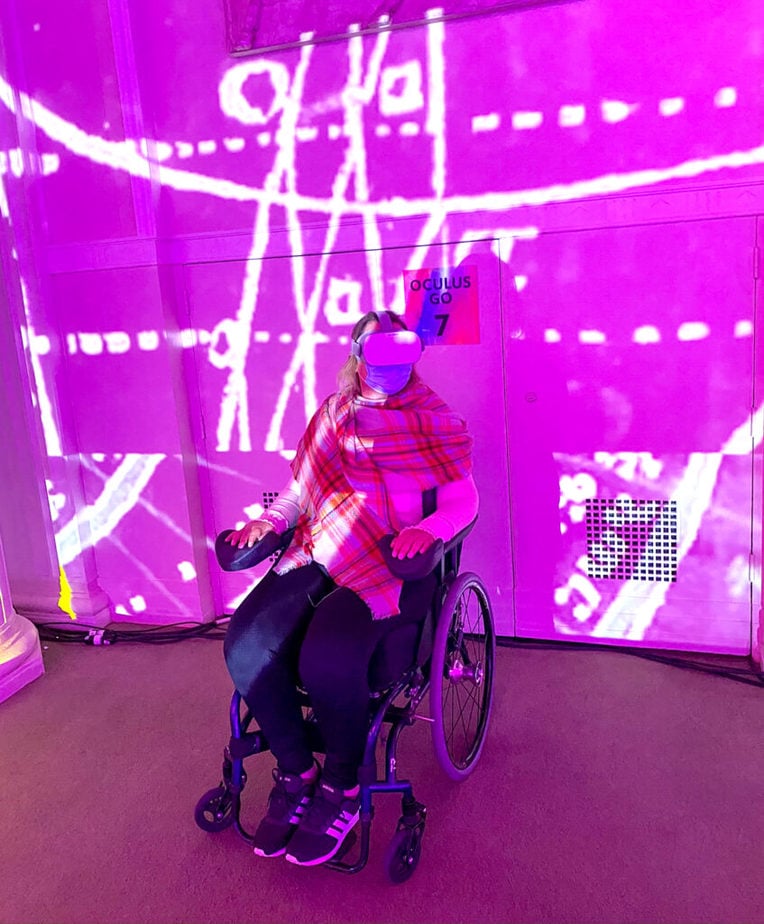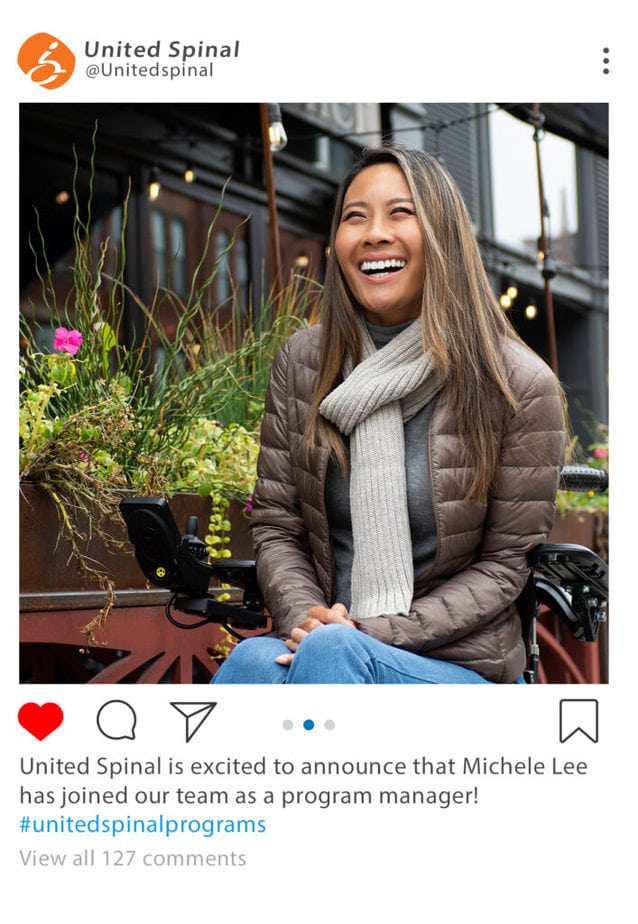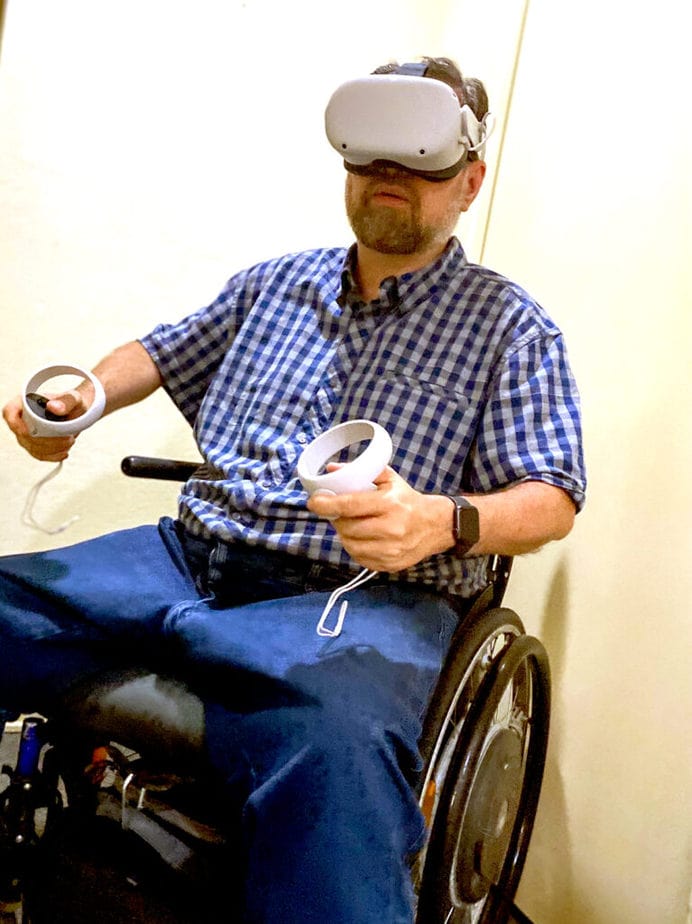
United Spinal’s Tech Access Initiative connects people with SCI/D to tech industry leaders to ensure the future of technology is accessible. Smart speakers, speech-to-text, autonomous vehicles, virtual reality … ground-breaking technological innovations like these have never been developed with people with spinal cord injuries and other mobility disabilities in the room. Until now.
United Spinal Association launched its Tech Access Initiative in February 2020 to ensure people with mobility disabilities have a voice in the future of technology. It’s 18 months later, and that voice is ringing out louder than ever.
At the heart of the Initiative are the Tech Access Group, composed of tech-savvy people with mobility disabilities and the Tech Access Council, a collection of representatives from leading tech companies like Apple, Comcast, Facebook, Microsoft, Google, Teladoc and Zoox. The TAG holds bimonthly meetings to share its experiences with TAC members on a specific technology — what works, what doesn’t, what could be better and what’s on the wish-list when it comes to accessibility. The meetings give both groups a chance to listen, discuss and ask questions to improve the accessibility of the next generation of technology.
United Spinal President and CEO Vincenzo Piscopo is thrilled at the Initiative’s early success and the organization’s expansion into the technology sector. “Technology advances too fast. If you think about where we were five years ago and where we are now, you see the advances are incredible,” he says. “If we don’t make sure our needs are taken into consideration during the development of the innovation, then it becomes too difficult to retrofit for accessibility.”
Getting in on the Ground Floor
United Spinal’s Grassroots Advocacy Manager Brook McCall, a C4 quadriplegic from Portland, Oregon, got a firsthand view of this problem while working with the organization’s policy team on its initiative to make autonomous vehicles accessible for all.

“I saw an absence of our community’s voice in tech advocacy opportunities,” she says. “It drove home that the needs of the mobility disability community are often overlooked by the people who make the tech products we use daily. While other disability communities have built strongholds that make sure they have access to technology, we had a key opportunity to take that on [as well].”
In February 2020, McCall became the first director of United Spinal’s Tech Access Initiative. She assembled her Tech Access Group from a diverse pool of people with various disabilities, injury levels, and employment backgrounds, including engineers, occupational therapists, and passionate consumers.
“We have a key opportunity to create a disability stronghold to make sure we have access to technology.”
“The first three meetings featured a group of people that I knew in the SCI community: strong advocates, United Spinal chapter leaders and folks with interesting perspectives,” she says. “I invited them to be stakeholders and speak for the community in this tech discussion space.”
Paul Amadeus Lane, a tech radio journalist and C6 quadriplegic from Huntington Beach, California, says the TAG’s message is clear: “Hey, listen to our voice. Learn about our frustrations and the discouraging feelings we have when it comes to certain tech products.”

Many tech company’s products either aren’t accessible at all, aren’t as accessible as they claim to be or are marketed as fully accessible even though they are too expensive or so user-unfriendly that the average person with a mobility disability is excluded. Michele Lee, a TAG member, points to voice-rec software as an example. “I use dictation to type a lot of my emails and navigate the internet because I don’t have finger function,” says Lee, a C5-6 quadriplegic who recently accepted a position managing United Spinal’s employment and disaster preparedness programs. “It would be great if dictation software could be integrated throughout all the programs that I use, but it only works for some. It’s frustrating when you pull up a different email program, and these different programs don’t always mesh well with accessible technology.”
“The way to counteract such frustration is to get us in in the beginning, get us in in the planning, get us in at R&D and get us in at the testing,” says Lane.
Mutual Benefits
To form the Tech Access Council, McCall leveraged United Spinal’s existing relationships with leading tech companies, built from the organization’s work on autonomous vehicles and other advocacy initiatives over the years.

Several companies joined and pledged to financially back the Initiative. By doing so, they support United Spinal’s work and ensure that the Tech Access Group members are compensated for their contributions.
Tony Le is the senior accessibility program manager for Cruise, an autonomous vehicle company based in Fremont, California, and a member of the Tech Access Council. He says participating in the TAC is mutually beneficial.
“I don’t have a disability, and who better to help build up this technology than the folks within the community themselves? It’s a lot harder to work with people one-on-one, but working with a national organization gives me an opportunity to tap into those resources directly. Plus, there are opportunities here. Why not reach out and ask the folks who’ve been leading the charge what would be most effective?” says Le.
Several Tech Access Council member companies have already recruited or hope to recruit Tech Access Group members to their own focus groups to develop accessible products.
John Lee, an assistive technology specialist with muscular dystrophy at California Polytechnic State University with a background in occupational therapy, was invited to participate in a paid accessibility research study for Facebook’s virtual reality headset, the Oculus Quest 2, thanks to his involvement in the Tech Access Group. He enjoys providing constructive feedback on products in all stages of development and hopes companies will appreciate the added value the TAG can add at early stages.
“It’s a lot clunkier to try to add accessibility in later. It just becomes a dongle that’s less streamlined, and the accessibility just feels like an add-on,” Lee says. “You have to bake in the accessibility, and the way you bake something in is as an ingredient from the start.”
Leveling the Playing Field
As the relationship between the SCI community and the tech industry’s leading corporations continues to grow, McCall hopes to grow the TAG and the TAC and amplify the conversation.

“Our next step is to expand our Tech Access Initiative stakeholder pool,” says McCall. “We want to have other people get involved and do more of these R&D specific projects because we have so many interesting voices that need to be heard in this space. We all want and need different things out of our technology, so we want to open that up.”
Part of opening up those opportunities is making sure the people who can benefit from technology can afford it. While some on the panel enjoy high-paying jobs and live in big cities, others come from more rural communities or survive on income assistance. All members reinforce the need for affordability that grants universal access to assistive technology tools and connectivity basics.
Michele Lee lives in downtown Chicago and has been working for an international financial services firm, and even she feels the pinch. “Having a disability is expensive on its own with a wheelchair and adaptive equipment, but I also use existing technology to help me be more independent. I use Amazon to buy things, I use Instacart to get groceries, and I don’t drive, so I Uber everywhere,” she says. “All these services aren’t free. They cost extra money. As a person with a disability, I know technologies don’t always work, and then you have to pay more for the technologies that are out there.”
The good news is members of the Tech Access Council are also committed to finding ways to make accessible technology cheaper for those who need it most. When Le brought his colleagues into a Tech Access Initiative meeting, they were blown away by how much those with mobility disabilities must pay to make their technology accessible.
“You have to bake in the accessibility as an ingredient from the start.”
He used the rapidly-changing world of cell phones as an example of how already expensive technology can be even more so for people with disabilities. “It gets cheaper for me every year there’s a new phone that comes out, and every year there’s a cheaper option, but people with disabilities may need the highest price features just to use a phone,” says Le. He believes the Tech Access Group is perfectly positioned to address this problem and provide equitable solutions for people with disabilities.
A Bright Future
While 18 months isn’t enough time to affect widespread change in the tech industry, McCall and her team are already contributing input on projects that are years out and confident that they are planting the seeds for a more accessible, affordable tech future.
“I’ve definitely learned that all of these people who work in these technology companies have really good intentions. I don’t think anyone’s trying to deliberately not design things for people with disabilities. A lot of it is awareness. They don’t even know that the things they’re designing aren’t inclusive,” says Michele Lee. “I used to think big companies are just out to make money, but I’ve learned they actually care, and I think that’s great. I hope it continues this way and more companies decide to join the Tech Access Council and collaborate because the more accessibility, the better.”
Support New MobilityWait! Before you wander off to other parts of the internet, please consider supporting New Mobility. For more than three decades, New Mobility has published groundbreaking content for active wheelchair users. We share practical advice from wheelchair users across the country, review life-changing technology and demand equity in healthcare, travel and all facets of life. But none of this is cheap, easy or profitable. Your support helps us give wheelchair users the resources to build a fulfilling life. |


I would be happy to help! I’m tech-savvy and in a wheelchair. I cannot walk and I have structural issues with my hands. I’m on a fixed income also. I have a number of smart devices that help me. I’m constantly having travel issues, as well as accessibility issues.
Hello Susan,
Thank you for reaching out!
Here is a survey link to get signed up: https://www.surveymonkey.com/r/TAI-Connection.